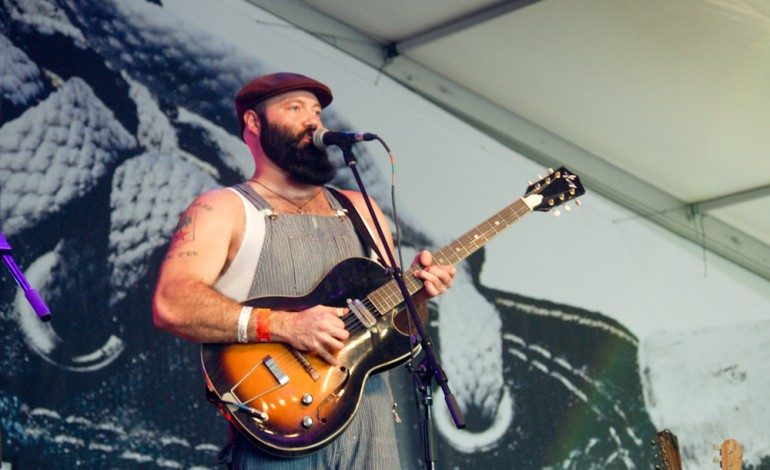

Some songs sound like ripped pages from journals, a quality ascribed to every line sung by Irish singer/songwriter Lilla Vargen. She’s cautious on “Hold On,” as she sang, “I used to believe in God/ And I used to believe in me/ But since I met you it seems/ All I believe in is disbelief,” but her voice was all-in, with a powerful, smooth evocativeness. She moved from electric guitar to the ivory keys for “Blueprints” and “Solitary,” the latter a wispy ballad. Her vocal range was emotive, rising and falling with the heartbeat of the simple melody.
With just one song in their discography, Enola Gay has nothing to lose. Frontman Fionn Reilly’s vocals on “The Birth of a Nation” were angry and wounded as he raged over a rattling bassline and the scream of thrilling, grungy, distorted guitar. Like all forms of protest, their sound bordered on the line of unpleasant and haunting, and yet people couldn’t turn away. Relevant and real, Reilly’s anger is almost necessary as he fumed about racism in Belfast and systems of oppression; “You’ll never kill our will to be free, cause in our minds we hold the key,” the surly vocalist rampaged with a thick tongue. Two unreleased, untitled tracks followed in a similar delivery, hinting that the young band has the kind of rigid, steadfast self-assurance needed to make important music not everyone likes to hear.
Nashville-based Americana troupe Great Peacock were warmer, with a sated, contemplative setlist plucked from their recent album, Forever Worse Better. The opening track, “All I Ever Do,” was hard to read, as frontman/guitarist Andrew Nelson and guitarist/harmonist Blount Floyd navigated a range of dark emotions from optimism to stubborn anger found in the trenches of almost-love. “Tell me there’s a reason/ Standing in the way/ I’ll keep on believing until I go insane,” Nelson narrated with somber, eviscerating vocals. “High Wind” offered a faithful, existential optimism, complemented by the nostalgic sound of the pedal steel, a Nashville staple played by instrumentalist Adam Kurtz. Floyd traded his guitar for the banjo on “Strange Position”—and though the lyrics delved back into an intricate mindset, a playfulness surrounded its mid-to-up-tempo beat and Nelson’s kickback, meditative new outlook.
The Reverend Peyton, lead of the Big Damn Band, is surly and unassuming, until his fingers hit the neck of the guitar with lightning speed to create an aggressive, weirdly astounding deep bluegrass sound. The band debuted an unreleased track called “Rattle Can”—a funky, loud number with a wicked electric solo at the end—and played a few new ones, including “Ways and Means” and “Too Cool To Dance.” “Washboard” Breezy Peyton was a giddy co-star, happily grooving from side-to-side and adding soft backing vocals to the Reverend’s husky, intense belt. The Reverend Peyton’s Big Damn Band are a force to be reckoned with, even if the band actually isn’t very big—and the only three instruments are a guitar, a washboard and a drum kit with a plastic pail.
Set List:
Lilla Vargen:
Hold On
Solitary
Blueprints
Enola Gay:
The Birth of a Nation
Untitled
Untitled
Great Peacock:
All I Ever Do, High Wind, Forever Worse or Better, Strange Position
The Reverend Peyton’s Big Damn Band:
Rattle Can
Ways and Means
Too Cool to Dance
Come Down Angels
Photo Credit: Raymond Flotat
